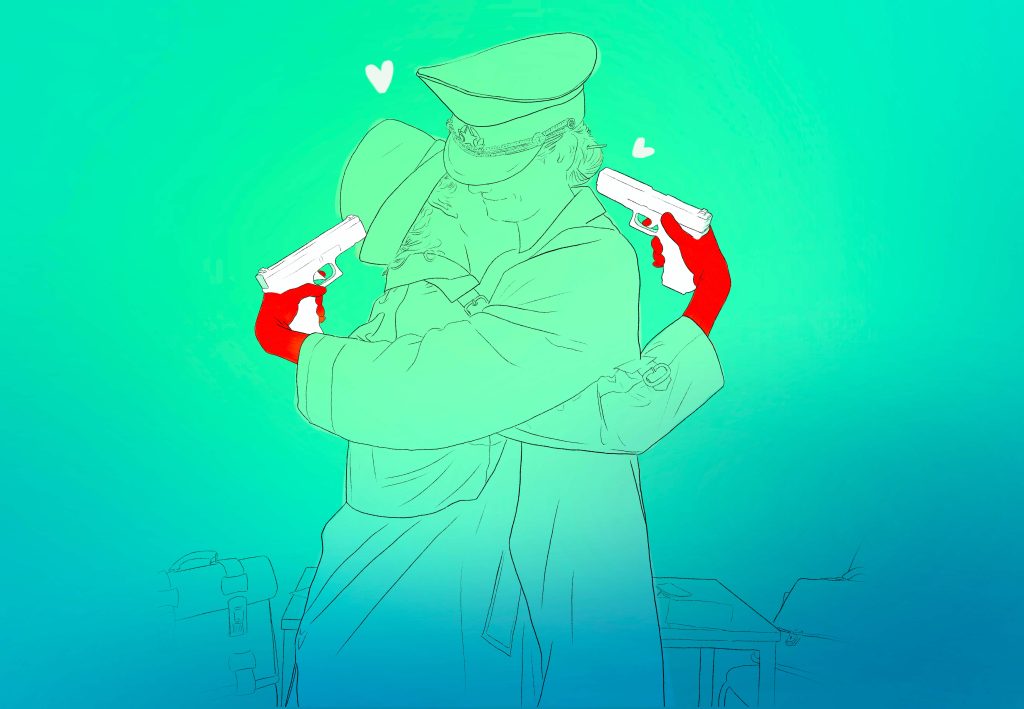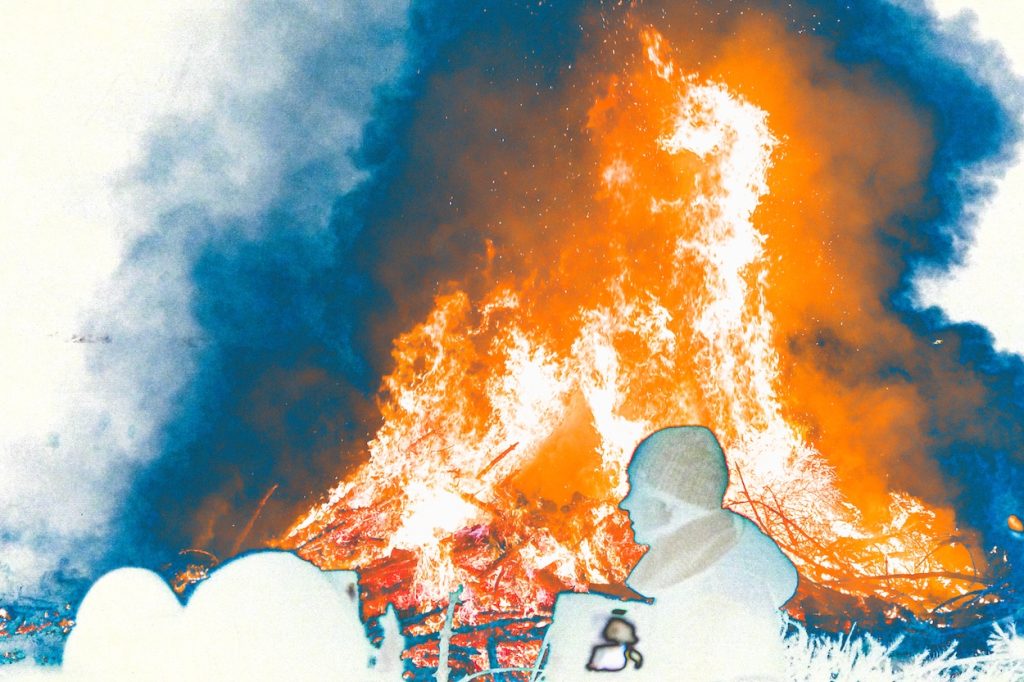Das Schauspielstudio der TU Darmstadt wird 75!
von Fernanda Schwab (07.08.2024)
Tipp vorab: Am Freitag, dem 16.08. habt ihr nochmal die Chance, das Stück zum Jubiläum des Schauspielstudios der TU im 806qm zu sehen! Die Aufführung um 20 Uhr wird von einer Pre- (17 Uhr) und einer After-Party begleitet, um das Jubiläum gebührend zu feiern. Sichert euch am besten direkt ein Ticket: https://pretix.eu/TUDS/75jahretuds/

Illustration: Margo Sibel Koneberg
Beginn. Der Raum ist dunkel, nur ein einzelnes Licht erleuchtet den Erzähler, der auf einem Sessel sitzt und ein Buch in den Händen hält. Er schaut zum Publikum und spricht, dann schlägt er das Buch auf und beginnt, eine Geschichte daraus vorzulesen.
Es ist die Zeit der Gründung der Bundesrepublik Deutschland. Eine Frage steht im Raum: Könnte ein Schauspielstudio dabei helfen, die demokratischen Vorstellungen zu unterstützen? Kann die Meinungsfreiheit dazu genutzt werden, das kritische Denken der Menschen anzuregen und sie dabei auch noch zu unterhalten?
Ein Regisseur sitzt an einem Schreibtisch und versucht, seine Inhalte mit Hilfe einer Schreibmaschine in Wortform zu bringen. Dabei wird er fortwährend von drei Personen unterbrochen, die versuchen, ihm ihre jeweiligen Interessen aufzuzwingen. Die Unterhaltung zwischen den Personen sind lehrreich und durch ihre Darstellung auch unterhaltsam.
Nebel wabert über die Bühne, verschleiert die Sicht und erfüllt auch den Zuschauerraum. Er leitet die nächste Szene ein. Der Regisseur steht vor einer Entscheidung. Soll er mit seinen Ideen politische Inhalte in Theateraufführungen einweben? Welche Auswirkungen hätte das für das Schauspielstudio? Soll er sich auf diese Weise gesellschaftspolitisch einmischen?
Eine der Aufgaben von Theater ist es, die Menschen dazu anzuregen, aktuelle Vorgänge zu hinterfragen. In der „Wischi-Waschi-Theater“-Szene der 1960er Jahre bezeichnet der Regisseur das Theater als „Nahrung für das Gehirn“.
Die inneren Gedankenvorgänge des Regisseurs werden in Form von zwei Personen auf die Bühne gebracht, die im Nebel um ihn herumtanzen. Es sind seine personifizierten Gedanken. Sie belassen es nicht nur beim Tanzen, sondern beginnen auch, mit ihm zu sprechen. Sie wollen ihn dazu bewegen, etwas „Neues“ zu beginnen.
Als das Schauspielstudio zu einem Verein wird, entstehen dadurch zusätzliche Aufgaben für die Teilnehmenden. Es wird ein neuer Vorstand gewählt und für die Einreichung eines Dokuments beim Vereinsregister ist eine Beglaubigung nötig. Die besondere Ironie und der Witz am Ende der „Büüürgeerramt“-Szene bringen das Publikum zum Lachen.
Für das Schauspielstudio war es eine große Herausforderung, die sieben Szenen, die in unterschiedlichen Jahrzehnten spielen, auf eine Länge von zehn Minuten zu begrenzen. Entstanden ist dabei ein wunderbares, kreatives und lustiges Stück.
Falls ihr euch vorab noch genauer über die einzelnen Szenen, oder aber hinterher darüber nachlesen wollt, werdet ihr hier fündig.
Ihr wollt auch als h_da-Studis selbst Teil des TU Schauspielstudios werden? Dann kommt bei einer der offenen Theaterübungen vorbei!
English version (automated translation):
The TU Darmstadt Acting Studio Turns 75!
by Fernanda Schwab (07.08.2024)
A tip in advance: On Friday, August 16th, you have another chance to see the play for the anniversary of the TU Drama Studio at 806qm! The performance at 8 PM will be accompanied by a pre-party (5 PM) and an after-party to celebrate the anniversary appropriately. It’s best to secure a ticket right away: https://pretix.eu/TUDS/75jahretuds/

illustration: Margo Sibel Koneberg
Beginning. The room is dark, only a single light illuminates the narrator, who is sitting in an armchair with a book in his hands. He looks at the audience and speaks, then opens the book and begins to read a story from it.
It is the time of the founding of the Federal Republic of Germany. A question arises: Could a drama studio help support democratic ideas? Can freedom of speech be used to stimulate critical thinking in people while also entertaining them?
A director sits at a desk, trying to put his ideas into words using a typewriter. He is constantly interrupted by three people who try to impose their respective interests on him. The interactions between the characters are educational and, through their portrayal, also entertaining.
Fog drifts over the stage, obscuring the view and filling the auditorium. It ushers in the next scene. The director faces a decision. Should he weave political content into theatrical performances with his ideas? What impact would that have on the drama studio? Should he get involved in socio-political matters in this way?
One of the tasks of theater is to encourage people to question current events. In the „wishy-washy theater“ scene of the 1960s, the director refers to theater as „food for the brain.“
The director’s internal thought processes are brought to the stage in the form of two people dancing around him in the fog. They are his personified thoughts. They don’t just dance; they begin to speak with him as well. They want to encourage him to start something „new.“
When the drama studio becomes an association, it creates additional tasks for the participants. A new board is elected, and for the submission of a document to the association register, certification is required. The particular irony and wit at the end of the „Citizen’s Office“ scene make the audience laugh.
For the drama studio, it was a great challenge to limit the seven scenes, which take place in different decades, to a length of ten minutes. The result is a wonderful, creative, and funny play.
If you want to read more about the individual scenes beforehand or afterward, you can find information here.
Do you, as h_da students, also want to become part of the TU Drama Studio? Then come by one of the open theater exercises!
- Kein Platz für die AfD an der h_da?Die Linke Liste F.I.S.H. fordert klare Haltung gegen Rechtsextremismus. Die Gruppe will, dass sich das Studierendenparlament (StuPa) offiziell von der Partei AfD distanziert und erklärt: AfD und Studierendenvertretung, das passt nicht zusammen!
- S(pr)ay it loudGraue Wände werden zu Kunst, während bei nächtlichen Streifzügen das Adrenalin kickt. Graffiti ist für viele Sprayer*innen gelebte Subkultur, in der sich FLINTA* langsam aber sicher ihren rechtmäßigen Platz erkämpfen.
- Wie viel Schwammstadt steckt in Darmstadt?Wer in die Einsteinstraße im Darmstädter Stadtteil Bessungen einbiegt, fühlt sich wie in die Zukunft versetzt. Es ist wie eine Vision vom perfekten und nachhaltigen Wohnen. Sieht so eine verantwortungsvolle Politik aus? Wie positioniert sich Darmstadt im Kampf gegen den Klimawandel? Und welche Rolle spielt dabei das Konzept von Schwammstädten?



